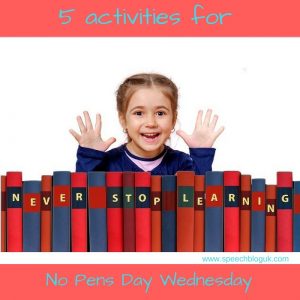Is your school taking part in No Pens Day Wednesday on 4th October? In case you haven’t heard of this, it is an initiative started by The Communication Trust which does just what it says on the tin – a whole day of teaching when no-one picks up a pen! This year will be the 7th year of No Pens Wednesday and last year 5700 schools across the country took part. Of those more than 50% said they would do it again and an impressive 83% said that taking part had raised their awareness of speech, language and communication needs in the classroom (figures from The Communication Trust)
By the way, you don’t have to run your day on 4th October. That is the focus day this year, but the resources are available all year round.
Why take part?
Why spend a whole day focusing on speaking and listening? As speech and language therapists, we think this is so important! To quote The Communcation Trust
“Of all the skills we develop at school, the ability to communicate effectively is the one that has the most profound and potentially positive impact on our lives. Communication is at the core of what we do: at home, in work, at school and socially. Strong language skills and good communication are key to whole school improvement, progression and attainment and supporting children and young people to develop these skills is vital.
For children and young people with SEND, a focus on communication can help support inclusion and independence. Good spoken language skills are strong predictors of later academic success. Children with poor language and literacy development at 5 are at substantial risk of low achievement at 7 and beyond.”
That sounds hard! What can we do in school that day?
The Communication Trust have loads of ideas on their website. You just have to fill in a short form and you can access activity ideas, lesson plans, resources and even suggested homework! Click here to find them.
As speech and language therapists, Elizabeth and I don’t often get left with a whole class of 30 children, though it does happen from time to time! We certainly used to often run whole class groups for 12 or so children with SEND when we worked together in a specialist centre. When I am left with a whole class of children, here are some of my favourite go-to activities. Perhaps they will give you some ideas!
- Hot Potato. This a great warm-up activity or a way to productively fill a spare 5-10 minutes during the day. Choose a topic – this could be something simple such as colours or animals or something harder like maths vocabulary or things to do with Romans. Use a beanbag or soft ball and pass it around the classroom. Each person has to name something to fit the category when they have the ball. They should try to pass it on as quickly as possible, but they also can’t repeat anything that has gone before. If someone gets stuck can someone else help them. They can’t tell them the answer but they can give a clue to help (eg “I can think of one that’s green, has sharp teeth and lives in water”). You can split the class into smaller groups or even do this in pairs so that each child has more turns.
- Story-telling. Split the class into small groups. Give each group a selection of objects, pictures or words (I usually give 3-4). See if they can work together to make a story which incorporates all of them. You could tie this into a school topic by giving out things associated with the topic.
- Acting it out. One thing I often target with children is adverbs (words which describe how you do something, such as quickly or suddenly). Choose a simple activity such as walking or washing hands and have a pile of adverbs. Ask the children to take turns in taking an adverb and trying to perform the action in that way so that the rest of the class can guess the adverb. Discuss what the person did to help them to guess or give other ideas of what eg “walking sadly” might look like. This activity targets non-verbal communication as well as speaking and listening and vocabulary skills. You can also use the same principle to act out other vocabulary relating to a class topic. Alternatively split the children into groups and get them to act out different events. For example, they could act out different historical events that you have studied or events that happen in a book you are reading in class.
- Describe it. This works in a similar way. Split the children into small groups or pairs and give each group a pile of written words or pictures (depending on the vocabulary you have chosen and the age of the children). One child takes one from the pile and has to describe it to the others so that they can guess. I often spend time first talking about what sorts of things are good to describe – what does it look like?, what does it do?, where would you find it?, etc.
- What do you think? Another key language skill which is vital for the curriculum is being able to express an opinion clearly, and understanding that others may have different opinions. In this activity I choose two things and get the children to tell me which they prefer. I usually get them to move to different parts of the room. For example, “if you prefer cats go to this side of the room, if you prefer dogs go to the other side of the room”. See if anyone can tell you why they made the choice that they did. Talk about how we all have different opinions and that’s ok. With older children you can obviously make the topics more challenging, and maybe offer more choices than just yes or no.
These are just a few of our favourites – there are also so many more things you can do! Share your ideas below this post to help us all!
Finally, one thing that teachers sometimes worry about with No Pens Wednesday is how they will record what happens. Again The Communication Trust have lots of ideas on their website. However, think about taking photos, making an audio recording and doing evaluations afterwards – both with the staff and the children – what did they learn?








Leave a Reply